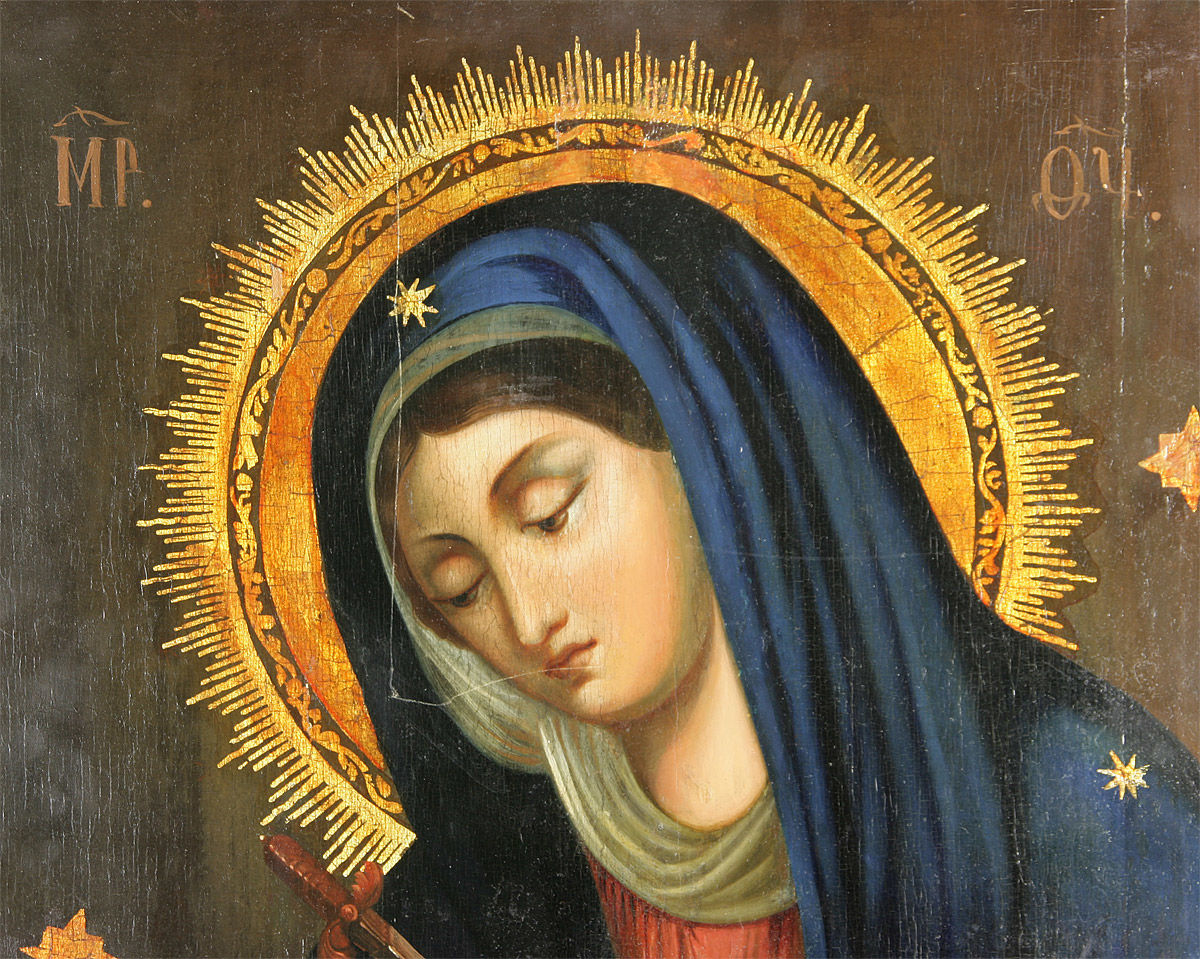Knowledge of the divine compassion results from what is perhaps the most intense movement of the Spirit in our hearts. The Virgin Mary—who is the Church as she dawns in a single person—is the mirror of this knowledge, its vital space. To know this compassion from within requires more than self-acceptance in joyful resignation; it requires that we say “Yes” with our whole being to the love that gives us life; it requires that we accept ourselves from the hand of the Father and entrust the burden of our human nature to Jesus, who carries it for us. (Jean Corbon, The Wellspring of Worship, 245)
What thoughts passed through Mary’s mind as she stood at the foot of the Cross, contemplating the dying image of her Son? Surely, she must have remembered all those hidden years in Nazareth where she and Joseph watched this child grow in wisdom and knowledge (cf. Lk 2:52). Or, perhaps Simeon’s prophecy in the presentation at the temple—that Mary’s heart would be pierced by a sword (Lk 2:35). Or, the signs her Son worked in word and deed, through which she finally began to understand the name bestowed upon him, Jesus, YHWH saves. Most of all, she must have found herself ruminating upon those words once spoken in sweet expectation, now softly uttered through the vale of tears: “Here am I, the servant of the Lord; let it be with me according to your word” (Lk 1:38). Did her fiat mean yes to accompanying her Son while he suffered? Did it mean that she too would remain in darkness about the divine plan? That the one who knew the richness of God’s grace must encounter such a tangible sign of the poverty of human existence?
But, as we all know, this level of poverty is necessary to all human life. We are poor relative to knowledge regarding our future. We are poor when we seek companionship and risk hearing the lonely word of rejection. We are poor in that we cannot live without the most basic material needs, food, water, and shelter. And we are poor in our mortality. Johann Baptist Metz writes:
. . . there is the inescapable poverty of death. It is the lodestone for all the various forms of poverty of spirit: the cutting loneliness of our own Being, the lonely resolve of loyalty, the apparent futility of our love, along with other manifestations of poverty. All these others are merely the prelude and the testing ground for the critical moment of death. It is here that the truth of our being is judged irrevocably. In death we experience the great poverty of our human nature; in death we carry out our obedience to our human destiny, with all its uncertainty and critical decisiveness. (Poverty of Spirit, 44)
Poverty in this way is the essence of being a creature (material poverty brought about through unjust social systems is distinct from this creaturely poverty). Sin is nothing less than denying our creaturely status, our poverty of spirit. And thus, Mary’s fiat is nothing less than perfect obedience to her own poverty. It is an openness of a creature, who has infinite faith that God might transform even this poverty into a sign of grace. Into a gift of the Kingdom.
Yet how? Mary’s fiat is a yes to love. What type of love, we might ask? Mary’s love, made manifest on this feast through her presence at the foot of the Cross, is embodied love. It is the love that a mother shows to her child unto the end. A love that does not end in death, a love that is so confident that even in the midst of darkness, it may become a light for the world. Such love transforms our creaturely poverty.
True, we cannot control our future, but we can love those we meet this day. True, we cannot end poverty tomorrow, but we can feed this hungry person, seek to alleviate systematic poverty in this community. True, we cannot escape death, but we can live in such a way that our lives become a witness that death is not the true meaning of our existence. Love is.
So, on this feast, we gaze upon Mary at the foot of the Cross because, as Corbon notes, she is an icon of the Church. We too stand at the foot of the Cross, we too are poor, we too know death. Yet, we too are called to love.
This love for us is never an idea, but it is a deed. It is the self-emptying of the Son upon the Cross, a love unto the end. It is the presence of a mother at her Son’s side, obedient even to death, a love unto the end. It is each of us called to live as if all is gift, in the midst of the most joyful and sorrowful moments of human life. And like Mary, we cannot do this on our own. The Son too tabernacles in us. In Baptism. In the Eucharist. In the Spirit’s urging throughout the life of the Christian. Slowly we are being prepared to make that perfect offering of self-giving love that Mary manifests at the foot of the Cross. Until then, may our words become that of Mary’s: let it be done to me according to thy Word. Happy Feast of Our Lady of Sorrows!
